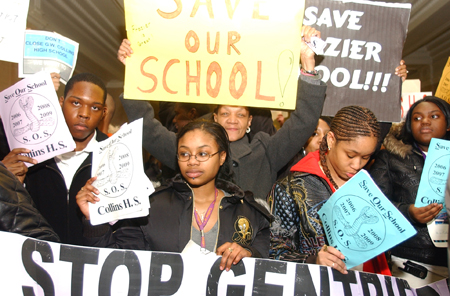States Hit Turbulence in School Overhauls

The Obama administration is stepping up pressure on states to make good on their commitments under its Race to the Top competition, after all 12 winners either scaled down plans or pushed back timelines to overhaul their public-education systems.
The U.S. Department of Education warned last week that Hawaii, which won $75 million in Race to the Top funding, is so far off track that the state could lose its money if it doesn’t start making good on its pledges. It was the first state to receive such a stern warning, though federal officials have threatened in the past year to withhold smaller amounts from Rhode Island and Delaware.
“If things don’t change, Hawaii is going to end up in a tough spot,” U.S. Secretary of Education Arne Duncan said during a press call Thursday. Hawaii education officials say they are making progress but acknowledge they have hit stumbling blocks to following through with the state‘s promises.
Race to the Top, President Barack Obama‘s signature education initiative, offered $4.3 billion to states that promised to transform their education systems. Competition for the grants prompted dozens of states to change laws governing teacher evaluations, adopt new academic standards, alter their approach to fixing low-performing schools and support the growth of charter schools, which are public schools run by nongovernment groups.
Eleven states and the District of Columbia won the competition and then submitted ambitious overhaul agendas with timelines for completion. But all the winners since have applied for-and received-permission from the U.S. Department of Education to alter their plans.
The Education Department has approved scores of waiver requests, including allowances for Massachusetts to delay plans to develop online courses for teacher mentors and for Rhode Island to push back plans to open more charter schools. Some states, including Florida, got sidetracked by overly optimistic target dates to hire contractors for developing student data systems or to create mathematical formulas for linking teacher evaluations to student test scores.
Delaware, Rhode Island, Georgia, Maryland and Hawaii got permission to push back by a year efforts to link student test scores to teacher evaluations that, in some cases, were to be used for tenure decisions.
New York was held up by a court battle with the New York State United Teachers union over a proposed evaluation system.
The delays and adjustments could give ammunition to critics of Race to the Top and affect future funding for the program, which has come under attack from House Republicans who object to a competition that rewarded states only if they adopted Obama-favored initiatives.
Mr. Duncan acknowledged that some states have “further to go” but said, overall, he is “extraordinarily pleased” with the progress. “This is really, really tough, hard work. There is a reason this work hasn’t happened for decades in this country.”
Most states are moving forward. Tennessee this year launched a teacher-evaluation system that rates all educators based on test scores. The policy has faced criticism because most teachers work in grades and subjects that aren’t part of standardized testing. Tennessee Education Commissioner Kevin Huffman acknowledged the policy might need to be tweaked but said he was “thrilled” state officials didn’t wait to launch it.
The widespread delays are causing concerns beyond the Education Department. Chiefs for Change, a group of 10 state superintendents who advocate for education overhauls, sent Mr. Duncan a letter in August saying the winners “must be held accountable” for implementing plans on time.
Sandi Jacobs, vice president of the National Council on Teacher Quality, a nonprofit group that advocates judging teachers on performance, said she isn’t surprised by the delays. “A lot of the states promised the moon and now, some of them are having trouble delivering,” she said.
Hawaii officials have sought permission to postpone almost every major component of their plan. Federal officials had gone along, until last week when the department sent the letter demanding that state officials get permission before spending any Race to the Top dollars. Federal officials also will send a team into the state in early January 2012 to assess the progress.
The major stumbling block is the state‘s inability to reach contract agreement with the Hawaii State Teachers Association. Hawaii promised in its application to link student test scores to teacher evaluations and use them for tenure and merit-pay decisions. They planned to launch the new system in the lowest-performing schools. All of that has been delayed.
Stephen Schatz, assistant superintendent in the Hawaii education department, said his state has lived up to some promises, including online student assessments and training some teachers on new, more rigorous statewide curriculum standards.
“We know implementation has been a bit rocky at times,” Mr. Schatz said. “But I am confident we will get back on track.”
Alvin Nagasako, executive director of the Hawaii State Teachers Association, declined to comment and referred questions to association president Wil Okabe, who couldn’t be reached.



